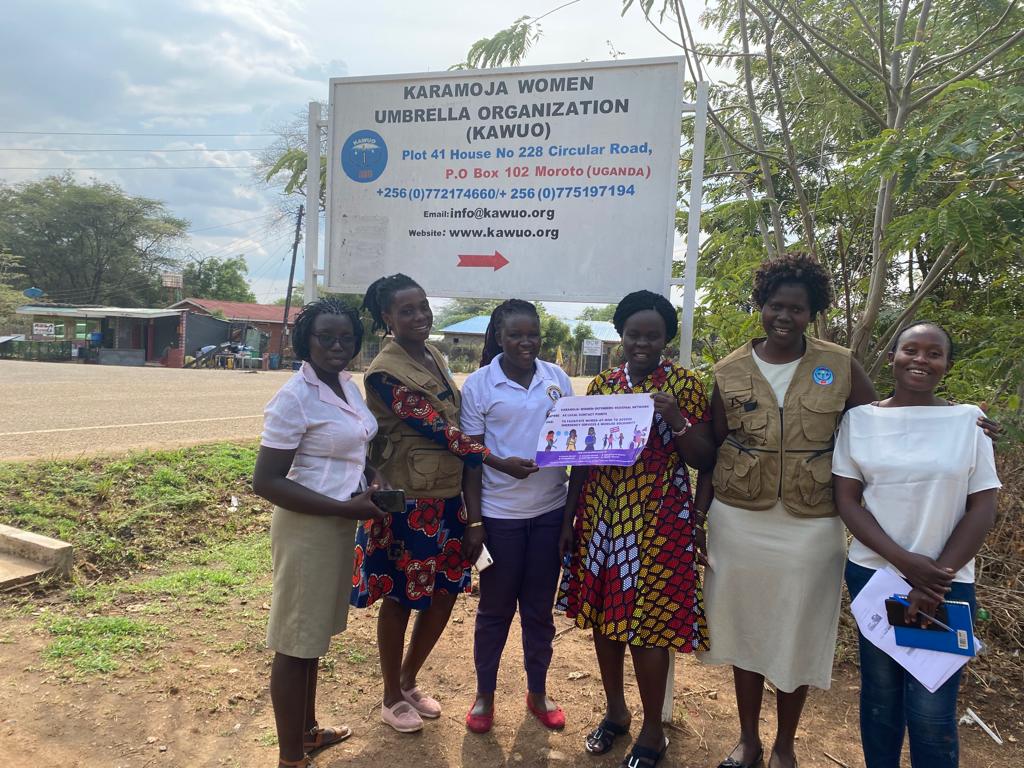
Tag: Women Human Rights Defenders Network Uganda

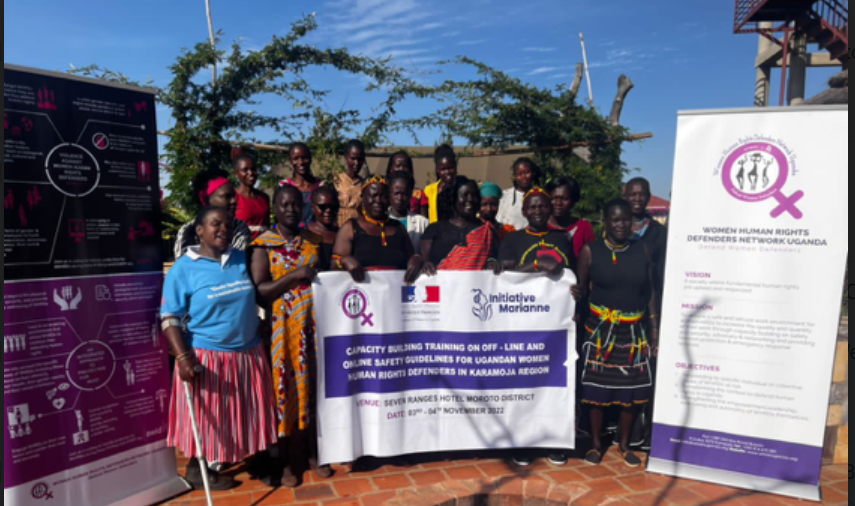
Women Human Rights Defenders undergo capacity building training in online and offline security guidelines
In November 2021, UN-WOMEN, UNOHCR (United Human Rights Office of The High Commissioner) and the WHRDN-U (Women Human Rights Defenders Network Uganda), published and launched safety guidelines for WHRDs titled “Our Voices, Our Power: Online and Offline Safety and Security guidelines for Women Human Rights Defenders in Uganda”. The report also called for urgent measures to deal with challenges facing WHRDs including equipping WHRDs with capacities and skills to mitigate the impact of online and offline attacks.
Upon this background, WHRDNU with support from the French Embassy of Uganda, conducted workshop to 20 WHRDs from Karamoja region. The training was conducted on 3rd and 4th November,2022, at Seven ranges hotel, in Moroto district. The two day activity was organized to strengthen the capacity of WHRDs and mitigate the impact of online and offline attacks against WHRDs, provide knowledge on preventing and mitigating gender-based attacks, criminalization of their work, as well as physical and personal security management, offer practical strategies for enhancing WHRD’s safety online & offline as well as provide WHRDS with basic safety tools for WHRDs in preventing and responding to attacks against them.

Remarks from WHRDN-U Secretariat
Ms. Brenda Kugonza of the WHRDN-U started by appreciating the French Embassy in Uganda noting that without their financial support, the training would not have happened. She thanked WHRDs for the good work they do to defend rights in Karamoja region and welcomed them to the training. Brenda then gave details on the objectives of training. She said that training workshop is to increase the knowledge and skills of the participants and their organizations the in relation to off-line and on-line safety guidelines. It would facilitate the spread of information, skills, and culture to prevent and respond to attacks, threats and risks both on-line and off-line by WHRDs. Training workshop was an opportunity to strengthen the capacity of Karamoja WHRDs because they had participated in developing the guidelines during a workshop that was conducted by UNWOMEN, UNOHCHR and WHRDN-U .

Remarks from the district representative
Ms. Betty Nakiru, a female police officer working with Moroto District Child and Family Protection Unit, in her remarks appreciated the WHRDN-U for supporting the work of WHRDS in Karamoja region. She urged participants to report to police when attacked for supporting girls and women the community. If also us the police women are attacked for supporting survivors of domestic violence and what about you. she noted that if women defenders are attacked, then the marginalized people suffer. She ended her remarks by urging them to get her contacts.

Role plays. Types of violence against WHRDs
Joan Namulondo of WHRDN-U, employed the role play methodology f in this session to further help participants understand the concepts. Four (4) scenarios (See below) were role played by participants to identify the online and offline, attacks, and gender-based attacks faced by WHRDs in their region. Reflections and learnings scenarios included:
- Human rights work is risky and the need to prepare to deal with un expected risks, threats, and security incidents.
- Human Rights activities cannot be successful without security measures.
- WHRDs in Karamoja, have suffered the same risks such as those roles played

DAY 2
Digital and social media security management
The purpose of the session was to learn about Digital and Online Security Management. The learnings were imparted when participants mentioned that digital security in relation to smart phones, mobile phones, internet café, phones, cameras, modems, flash discs, emails, watsapp, Facebook, Twitter, Instagram, Tiktok etc. Through a brain storming session, participants learnt some basic computer security measures such as to install antivirus to protect their computers from malware and hackers, to create and maintain secure passwords, have strong different passwords for different services and phone security measures such as the safest mobile phone is a cheap, unregistered, don’t save sensitive information on your phone, make sure all your information is deleted on your mobile before selling it or having it repaired, destroy unusable phones and old sim cards before discarding them.

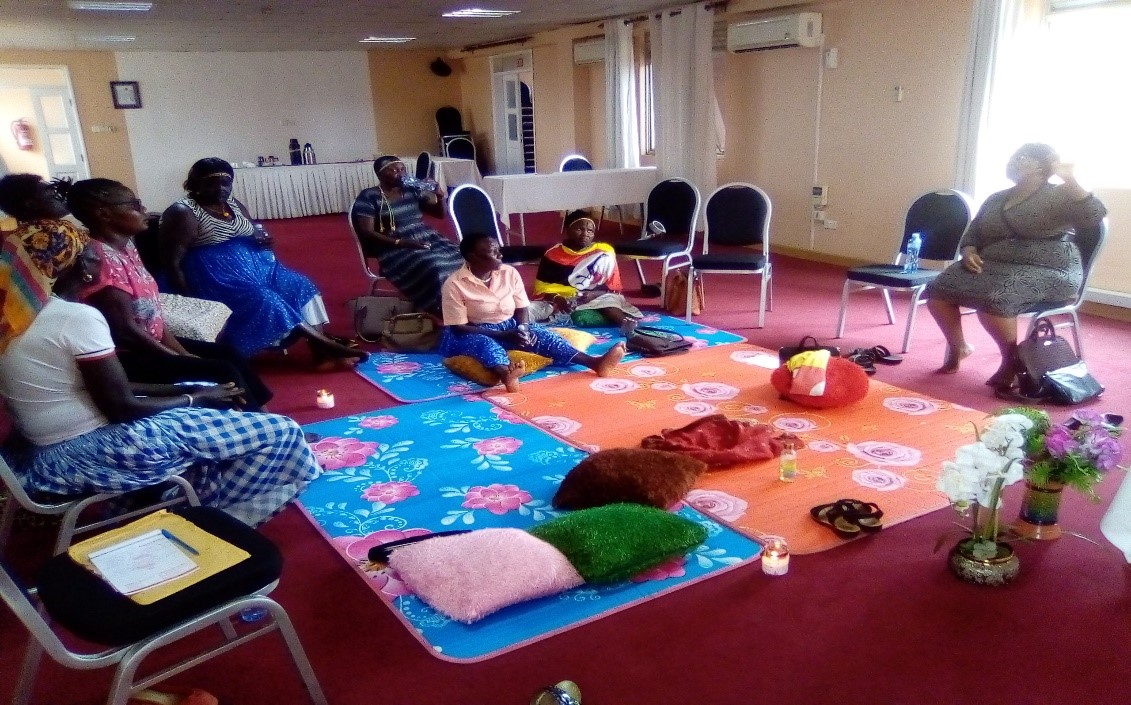
WHRDS from Amudat undergo a 3 day self-care and wellness workshop
The Women Human Rights Defenders Network Uganda (WHRDNU) conducted a three days protection and rapid response self care and wellness workshop for eight women human rights defenders from Amudat district, Karamoja region. This was organized for them to relax and have time to enjoy and forget their risky human rights work like Female Genital Mutilation (FGM), supporting victims of torture and child protection.

Dr. Birungi Lynda’s medical counselling session
Dr Birungi Lynda, a medical councilor encouraged the WHRDs to always love themselves fast before loving others citing that “If you don’t love yourself you cannot love others, we must be selfish to ourselves, if you do feel like you want to look smart go ahead and put on your nice dress”. She also emphasized to the WHRDS to create social groups where they can save their money. She further encouraged the WHRDS to always do things that make them happy “Some of us have intimate partners who are difficult in our marriages, friends that don’t treat us well and neighbors who are difficult, but let us look at those things that make us happy and start taking care of our selves’’.

She advised the WHRDS to care of their bodies by going for medical check-ups and also have a balanced diet ,”For example when you wake up in the morning ,do your millet and take millet porridge because it has a lot of nutrients like iron .Go for medical check-up if a group of health workers have come in your community please go for breast examination or cervical cancer screening because sometimes if you don’t go for medical check-ups and you wait for the pain to come then that indicates that it is too late to save yourself’’. Furthermore, Dr Birungi emphasized that as women human rights defenders they have a right to decide the number of children they want and also to choose to have children or not because some women are not giving birth to children.
Counsellor Ruth Matoya Kemunto session
Counsellor Ruth stated that women human rights defenders should learn to appreciate themselves for the human rights work they do in their communities because if they don’t know one will appreciate the work that you as women human rights defenders. And encouraged the words to always surround themselves with positive people with positive ideas.
The counsellor encouraged the WHRDS to take care of bodies, mind heart and soul by doing activities that bring joy and happiness, “When you feel good it is the medicine of the heart because no one will give you happiness’’ because as WHRDS they do a lot of work that always brings them stress, anxiety and sadness.
She advised the WHRDS to;
- Buy for yourself sweets
- Have fun go for parties and dance
- Align yourself with positive people in your communities and eliminate negative people in your life.
- Go for a walk and do exercise to keep your bodies strong and health.
- Drink at least two glasses of water in the morning and before sleeping often because it is helps on ulcers and pressure.
- Eat well balanced deity like vegetables, fruits and water.

Women Human Rights Defenders speak out after the self care and wellness workshop.
Women human rights defenders implement self care and wellness in Amudat.
As result of the self-care activity the women human rights defenders from Amudat implemented their own a self-care and wellness activity in Amudat.


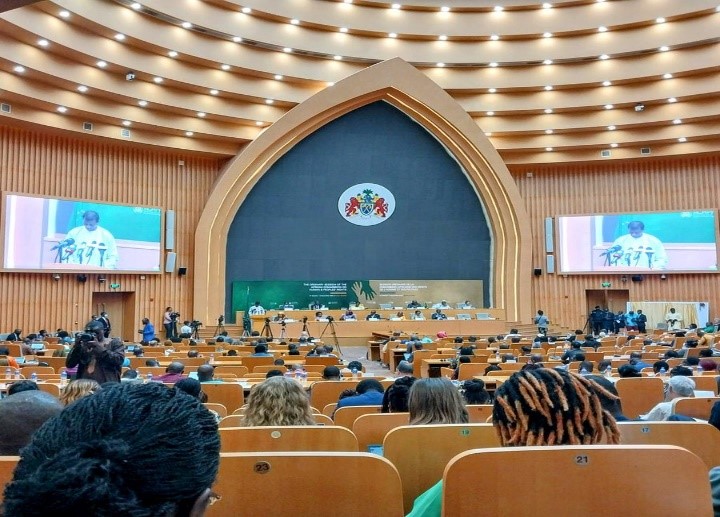
Women Human Rights Defenders Network Uganda participates in the ACHPR 73rd Ordinary Session
From 17th – 20th October2022, The International Service for Human Rights Defenders, supported the Women Human Rights Defenders Network Uganda to participate in the NGO Forum of the 73rd session of the African Commission on Human and People’s Rights (ACHPR) and the opening of the ACHPR 73 ordinary session. The two important events took place in the Gambia, West –Africa.
We thank the ISHR for responding to calls by women human rights defenders to engage with the ACHPR special procedures mechanisms to raise awareness about the gendered impact of restrictive environments on WHRDs.

On 18th October, the second day of the NGO Forum ahead of the 73 session the African Commission on Human and People’s Rights (ACHPR), Civil society discussed issues around limiting press freedoms, stifling citizen efforts to hold their governments to account and gender-based violence.
The Special Rapporteur mechanism on human rights defenders, Hon. Remy Ngoy Lumbu in Africa commended states parties of Cote d’lvoire, Burkina Faso, Mali and Niger for having adopted laws for protection of human rights defenders and called upon other state parties to emulate the state parties with laws to protect human rights defenders. He added that states should establish protection mechanisms for human rights defenders.
#ForumAchpr73 @PorokwaE calls out the solidarity of civil society in Africa to talk more about the critical situation of indigenous people in #Tanzania. He also emphasizes the need for the @achpr_cadhp to take cases of torture and eviction of these communities more seriously pic.twitter.com/C3sCaGMvpr
— Adélaïde ETONG (@Adelaide_ISHR) October 18, 2022
Engagement with the Special Rapporteur on Rights of Women In Africa
WHRDN-U had the privilege to engage with the Special Rapporteur on Rights of Women In Africa, Ms.Janet Ramatoulie Sallah-Njie, who we called upon to work with the Special Rapporteur for human rights to develop a stronger gender perspective to protect WHRDs and to offer technical assistance in the development of the HRD protection bill.


Position Paper By WHRDNU on the need for Integration of Gender into the Human Rights Defenders Protection Bill 2021
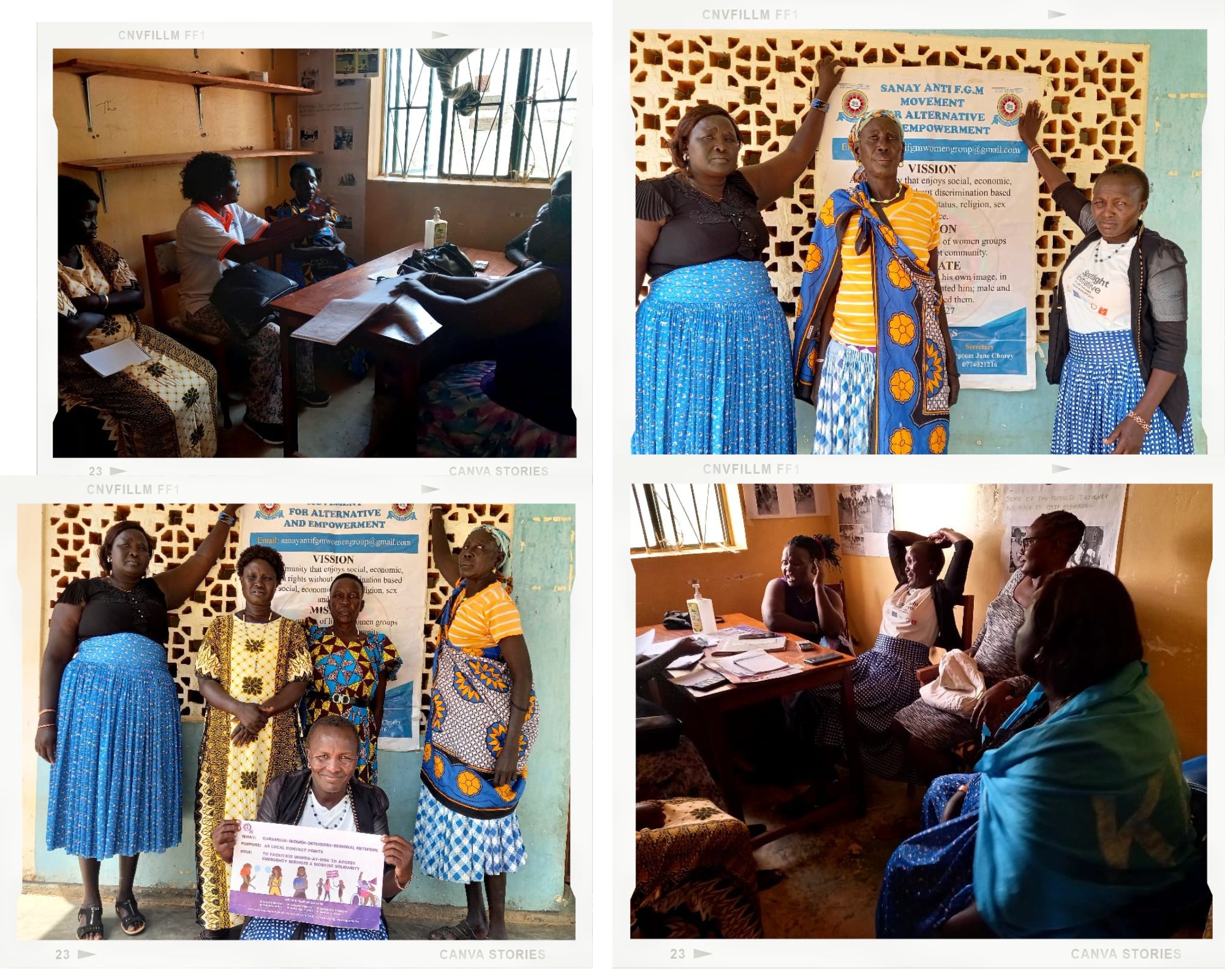
WHRDN-U hold consultative meeting with WHRD groups in Karamoja sub region
On 30th July 2022, WHRDNU held a consultative meeting with 7 WHRDs groups belonging to Sanay Anti-FGM movement based in Amudat district, Karamoja sub-region namely:
- Maedelo Ya wanawake
- Kamesoi Women’s Group
- Natukuman,Salcco –Safe and Learning Committee
- SinjololChepkarlal, and Sanay women groups
The objective of meeting these groups was aimed at 3 important aspects
- To understand what kind of threats and risks, have WHRDs registered
- To a establish linkages between WHRD’s security incidents to the context and the social, political and economic analysis in Karamoja region
- To understand protection needs of at risk WHRDs

Area activism work done by WHRDS
Despite the difficult environment, WHRDS have continued their activism related to defending women’s rights to a life free of violence particularly fighting rape, Female Genital mutilation, and early marriages, supporting victims of torture, unlawful arrest, HIV, Child protection. They strive to build and sustain community networks for protection. SANAY Movement’s campaigning strategy include educational talks, discussion groups, radio talk shows, use homes as shelter for girls experiencing difficulties in their families, for refusing to undergo FGM.
Ms. Paulina Chepar, is the Chairperson of Sanay Anti-FGM Movement, in Amudat district. This movement is a community based organization made up of women groups that defend rights of women and girls, supporting FGM survivors and Women, and promoting women’s economic empowerment. Due to their work of fighting FGM, GBV, early marriages etc. SANAY members usually suffer attacks, threats of killing, arrests and assaults.
Ms Pauline Chepar speaks on her fight against Female Genital Mutilation.
Paulina told the WHRDN-U team that one of the important achievement is ‘the way we engaged community surgeons (traditional –women-cutters of girls) ,trained them and raised awareness about the dangers of FGM. I am proud of one Rebecca Lotukomoi -a community surgeon in Cheporoi community, who was a very well-known expert and respected for cutting girls, with our activism work , Rebecca stopped the practice of cutting girls, Rebeca mobilized other cutters, together they formed a group known as former surgeons called Sinjolol group of ( 15 defenders) to start the campaign to end FGM”…SANAY movement, has created partnerships with various NGOs, UN and managed to influence communities to fight FGM through her community sensitization efforts “ I feel happy my because my work has managed to influence surgeons to form groups, said Paulina Chepar.

Security threats faced by WHRDs
- WHRDs are finding a harder time voicing out human rights violations and rape cases in Amudat. The 7 WHRDs informed WHRDN-U team that during COVIP- 19 period, “we registered incidents of rape, murder eg in Karita 13 women were raped and 6 of them were killed in 2021. After raping, sticks and pangs were inserted in their private parts,In Amudat Sub count 2 Women were raped and murderd in 2021, Amudat town council 18 raped and 3 died in 2021 and In Rolo subcounty 7 were raped and two killed. Accordining to Alungat Joyce of SALECO group”. “when we saw these rampant rape cases , as WHRDs belonging to :Sanai ,Maedelo Ya wanawake, Kamesoi Women’s Group,Natukuman Womn’s group,Salcco –Safe and Learning Committee, NAWOU,NAWOU, Sinjolol, and Chepkarlal, we gathered , went police to demand for justice met DPC mwesigye and demanded that perpetrators be brought to book and have police patrols in the communities. We buried women raped and murdered.”Said Dorcus Chelain. Mar Kiza stated “Members informed WHRDN-U team that some of the perpetrators of rape where arrested from a drinking place and instead sellers of chnagai (sellers of local brew)- keep threatening and insulting us that we shall bewitch you and see if you will survive because you are arresting our sons and customers”.
- Paulina stated that when I joined Mercy Corps and the Community Development Officer, on July 5th and went to Ngongosowon village for sensitization on dangers of FGM, I heard voices of people shouting my name that Paulina you are the one reporting us to the Police and the Resident District Commissioner and warning me in order to silence me and I leave in fear and panic.”
- Similarly, Lotukomoi Rebecca explained that when i mobilized a group of former surgeons (cutters of girls) and started a campaign to end FGM, this decision and action attracted hostility from her community. I faced resistance, isolation, stigma and i was chased away from her community by elders and SANAI gave her shelter, with income generating skills . I have continued by campaign and I face risks to my safety for example I have been told and accused that I am the one reporting surgeons or cutters to the police since I was a former cutter, I can’t move alone in my community I fear mob justice.”
Impact of the threats and risks to WHRDs
According to Chepar Paulina, Given the hostile context, our children, parents, constantly worry about our work.

Sagal Paulina: We have additional pressure as defenders affecting their mental wellbeing and activism work. It is too much for us in a context of this crisis ,no funds, dealing with rape cases, FGM, working on difficult issues of famine, locust, rape,COVIP-19,. Tell me how you won’t forget about you wellness and risk your mental wellbeing- We care so much for others and who is there to care for us in all these difficulties. In fact we don’t sleep because in night you are thinking of solutions to help people whose rights have been violated.
Culturally rape is seen as courtship process. We face challenges in championing rights of women and girls, fighting rape,we don’t have protection from authorities because some of them do not believe in human rights of women and girls, people think we are bringing cultures that are not for Pockot people said Mary Kiza.

Joyce Alungat explained “ Because of doing my GBV work, family planning awareness, providing shelter to girls resisting FGM, referral GBV survivors to access services at the Police, Health center , NGOs, etc. I have been targeted through body shaming and damaging my reputation. They tell me you woman with big ass you are the one spreading HIV, you are Chepkartayan (meaning you are a prostitute), gathering children for prostitution. I have been told I am a bad mother, very immoral, publically shaming me. Sometimes you lack support and solidarity.
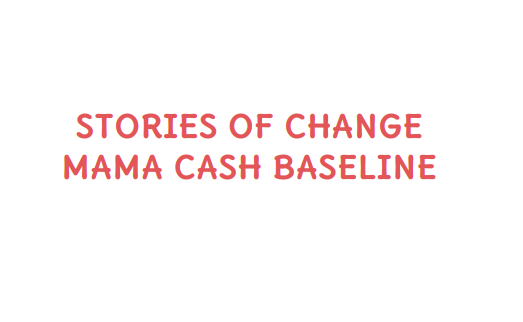
Mama Cash booklet: Stories of change
Women Human Rights Defenders Network Uganda is honoured to be part of the Mama Cash booklet of stories that is an accompaniment to the Mama Cash Baseline Narrative Report and presents 16 stories written by grantee partners (GPs) participating in the Mama Cash Baseline process in September 2021 – April 2022.
During the Baseline process Recrear offered GPs a virtual learning series aimed at:
1. Learning about how the groups are progressing along different outcomes;
2. Sharing storytelling for LME as a tool they could apply in their own contexts, organizations
and communities;
3. Providing a space for collective learning and networking with other grantee partners
Stories about co-coordinating with others.
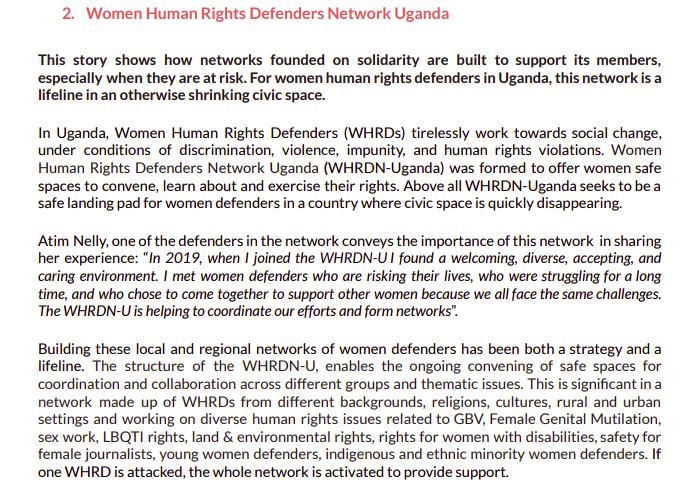
Access the full booklet below
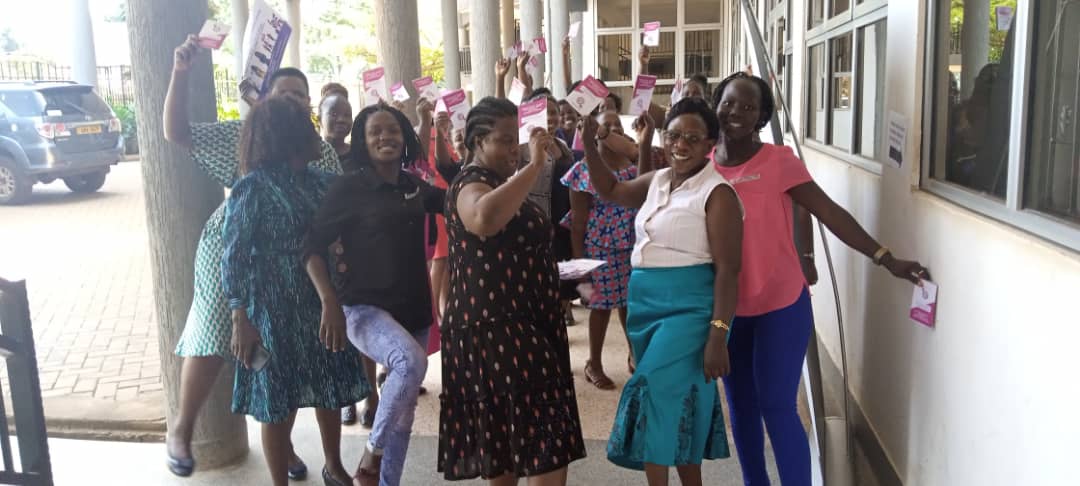
WHRDN-U CONDUCTS ALBERTINE REGIONAL COORDINATION MEETING
On 19th May 2022, Women Human Rights Defenders Network Uganda organised a regional cordination meeting for Women Human Rights Defenders in the Albertine region in Hoima district. The meeting held at Hoima Resort hotel consisted of 22 WHRDS from Hoima (6), Masindi(5), Bullisa (6), Kagadi(2), Kiryandongo (1). This meeting was held in line with the efforts of WHRDN-U to achieve a well-coordinated national feminist Holistic protection program and a secure working environment for WHRDs in Uganda.

Objectives of the meeting were to
- To strengthen local support systems to offer timely response to WHRDs under attack in West Nile Region.
- To offer a training on how to fill the case incidence form
- To understand why one is unable to receive support whenever attacked
Ms Beatrice Rukanyanga the district focal person welcomed everyone to the meeting and told all the participants to share and interact freely and made an emphasis that, “Human rights activism work is given from God and it’s in our Blood despite the fact that defenders are attacked every day, we still continue to defend Human rights. Individually we cannot stand but when we work as a team it’s hard for the community to attack and pin us down, we have to work as a team and support one another” She further encouraged members to carry out solidarity visits among themselves.

Remarks from Gender Officer, Ms Kabatalya Joyce
Kabatalya Joyce thanked the WHRDS for the good work they were doing in their different communities.She said there are very many cases of violation of human rights at grass root levels and was glad to see a group of brave women who are risking their lives to defend the rights of such people, she encouraged the WHRDS to continue with this good work and re-assured her support whenever needed. “I am ready and willing to work with you, the different government institution have to work with you and you with them so that to make a big impact in the community”

Poster presentation and dissemination of the online GBV handbook for WHRDS.
Posters were distributed to members and each one was tasked to pin them in their work places to help create visibility of the network.

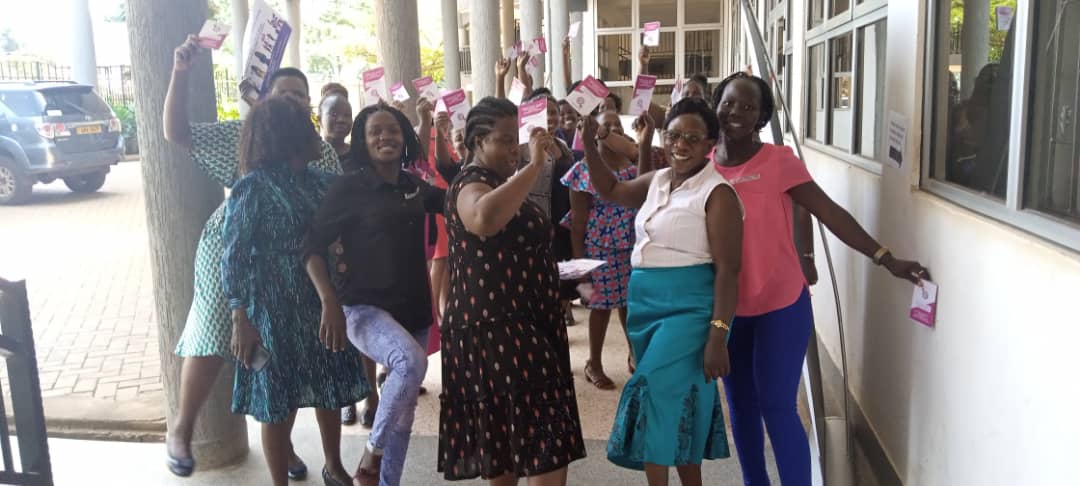
By conclusion of the meeting, participants knew the different ways of strengthening the local support system in case of attacks, shared action points on how they would support one other and also learnt how to fill in the incidence forms.
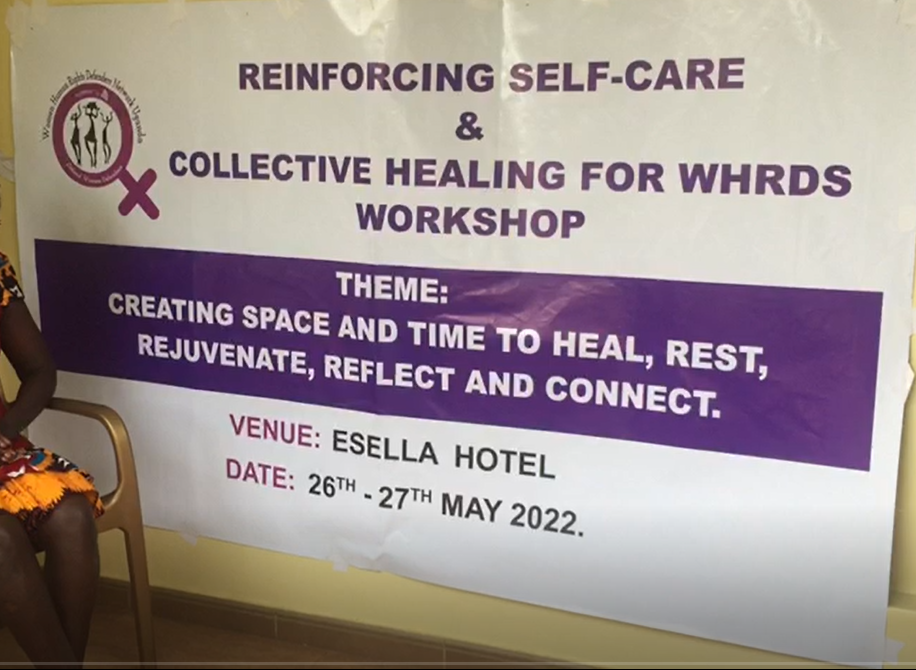
SELF CARE AND COLLECTIVE HEALING FOR WOMEN HUMAN RIGHTS DEFENDERS
On 26 and 27th May 2022, The Women Human Rights Defenders Network Uganda held a “ Creating Space and Time to Heal, Rest, Rejuvenate, Reflect and Connect” workshop at Essela Hotel, Kampala . Over 25 participants from different parts of the country and various social movements benefited from the workshop.
The workshop provided a space for Women Human Rights Defenders to understand their lives of activism. Different members had things to say about how their activism work affected their well-being.
They are dedicated, passionate about their human rights work, and caring for others while forgetting about themselves. The WHRDS said all this is making them burn out, the job of defending never stops, Not for Profit Organizations and Community Based Organizations understaffed, yet the lives of the people they served depend on their actions, the WHRDs noted working in the evenings, on weekends, skip annual leave and when on annual leave, they check emails-because they think if they ignore them, they will pile. To some, they have pondered about living their activism work to joining the business sector.

The workshop also enabled participants to practice self-care, thus empowering them to manage their health to take care of their own emotional, physical, and mental health. The many ways in which members practiced rest, rejuvenation, and healing included the following:
- Group counseling session :
In this session, participants understood how stress and burnout could result from human rights work in Uganda. This session helped WHRDs prevent burnout and ensure their psychological security. The WHRDs noted that they suffer violence, harassment, discrimination, and criminalization, leading to burnout. This session used group discussions, and they learned tips to help them recognize moments of stress, feelings of anxiety, and time management

2. Fitness session ;
This session motivated and inspired participants to sustain a healthy lifestyle, and it was to help participants get their hearts and lungs to work faster; it was a fun atmosphere. The session involved stretching, dancing exercises to help with the body’s flexibility, and muscle strengthening for the legs, hips, the back, chest, stomach, shoulders, and arms. Breathing work, the facilitator informed participants that breathing helps control the nervous system and that having deep breathing, even for a moment, can help soothe people’s anxiety and calm our panic.

3. Nutrition, Diet and food.
Ms. Elizabeth Masaba, a nutritionist, helped participants understand food as our primary source of medicine. She informed participants that what we eat and drink affects our energy levels, our moods, and how and what we think.

She urged WHRDs to create time for food breaks. By cutting a cake decorated as a healthy eating pyramid, as an illustrate, she encouraged members to maintain a balanced diet and that foods make up a healthy diet.


4. Health benefits of massage Therapy for WHRDs.
Massage consultants enabled participants to understand that massage can combat stress and anxiety, increase blood flows to areas of the brain that associate with mood and stress regulation, boost immune systems, improve sleep, relieve pain and fatigue, etc. Trained massage therapists eased pain and tension by massaging the muscles and joints of body participants. Thus the, using different massage techniques during session this promoted relaxation among participants.
5. Conversations, Networking, Music and Dancing sessions.
During this session, it was a question n from the Urgent Action Fund for women “what is the point of a revolution if we can’t dance?’. This platform allowed WHRDs to dance, and women danced. The participants recognized the health benefits of dancing as a tool to stay fit for all ages, is a great way to meet new friends, improve muscle tone, better social skills, and help the heart and lungs.

6. Gynecology and women’s health session.
This session was essential for WHRD’s reproductive health. Ms. Birungi of Reproductive Health Uganda covered cancer screening, menstruation management, post-menopause management, and family planning. The objective of this session was to promote the health and well-being WHRDs by offering them information and improving their knowledge on reproductive health-related matters.

Here are some of the ways in which WHRDs committed to practice self-care and collecting healing:
- Take an hour for lunch break, limit taking office work home, and create me time
- Minimize interactions with social media platforms, and go for regular medical check –ups
- Go for a walk, and have a good diet,
Reflections from participants


Ataro Juliet of Women Rural Development Network speaking at the Self Care workshop
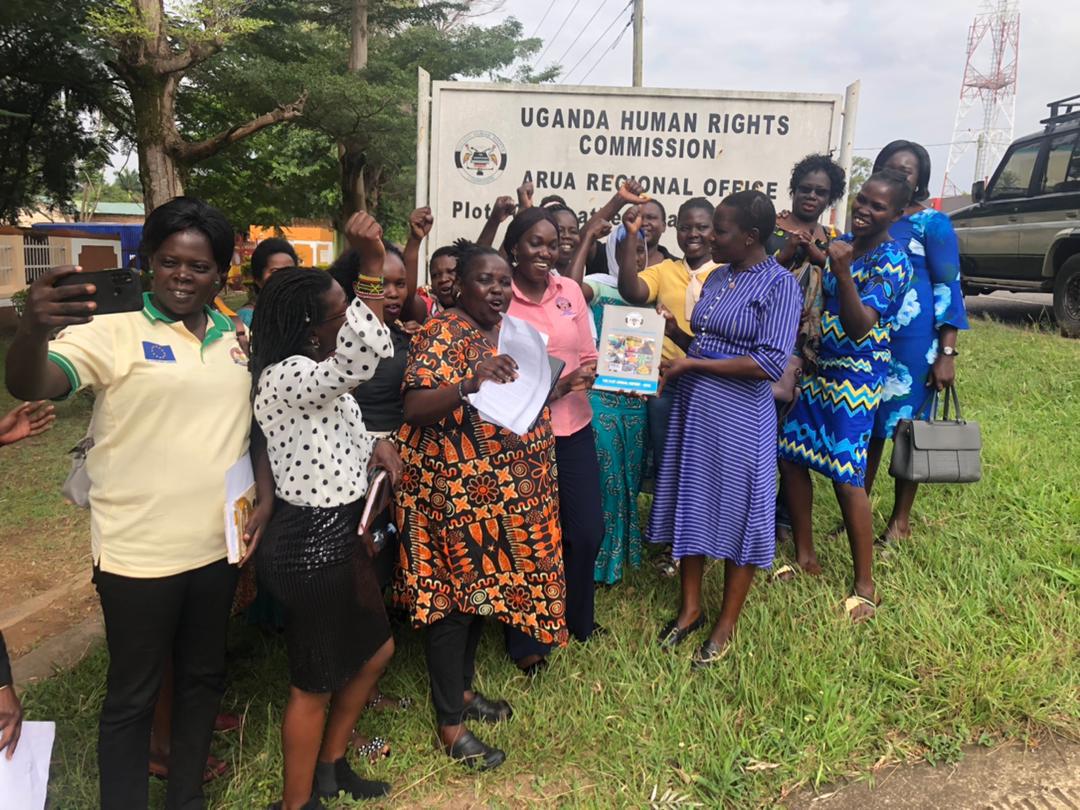
West Nile Women Human Rights Defenders Regional Network pay courtesy visit to Uganda Human Rights Commission
On 25th March 2022, 25 members of the West Nile Women Human Rights Defenders Network paid a courtesy visit to the Uganda Human Rights Commission (UHRC) offices in Arua. The delegation of Women Human Rights Defenders(WHRDs) was received by Kisa Daisy, the Human Rights Officer in charge of Investigations who handles complaint of Human Rights violations in West Nile. In her remarks, she stated
“We are happy that as the West Nile Women Human Rights Defenders Chapter, you recognise the work of the Uganda Human Rights Commission. It is empowered by the constitution to protect and promote rights of all in the country. That’s why in our report of 2018, we dedicated a chapter for women human rights defenders and specifically put in a topic on especially the women because they go through a lot. Generally Human Rights work is risky work.”

She further stated that she was glad to have met the WHRDs and this meeting was the beginning of a formation of a mutual relationship and connection between each other. She promised to involve members of the West Nile WHRD regional network in upcoming trainings and meetings that would benefit their participation.
“There is need for us to work together and have active communication amongst ourselves. This forms a bond of solidarity and also a protection layer where WHRDs aren’t isolated and easily attacked. And our impact will be felt in the West Nile region.”

Rosemary Kyemba, a WHRD who was part of the delegation that visited said the group consisted of Women Human Rights Defenders defending Rights of the LGBQI, land and environmental rights and rights of indigenous people. She stated
“In our communities we are working in, we are working to promote the rights of everyone. In most cases WHRDs are attacked in different ways due to the nature of their work. We call upon you as the UHRC to always support us whenever we report cases and also feel your presence in the communities in the sub regions where we defend people.”

